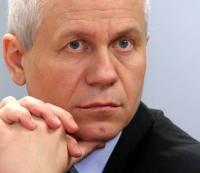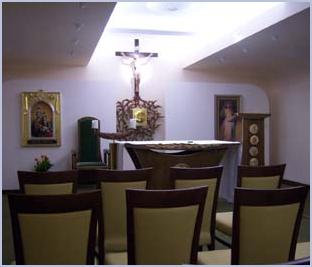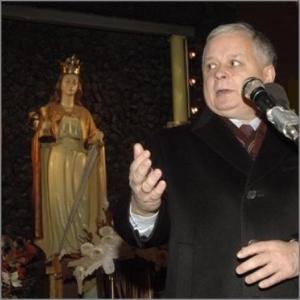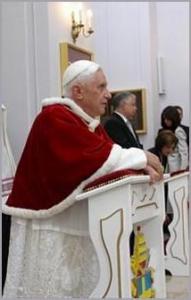 Chaplain leads parliamentary rainmaking
Chaplain leads parliamentary rainmaking
Poland's parliamentary and presidential chapels are state-funded and have their own Catholic chaplain. They offer religious services on topics of current political interest and afford clerics privileged access to the lawmakers. And in the summer of 2006 the parliamentary chapel was the scene of what was greeted with mirth as a rainmaking ceremnony.
The parliamentary chapel
 By late July in 2006 there had been no rain for weeks and Poland was parched. This prompted The Polish MP Marek Jurek to seize the meteorological initiative. He had left the Law and Justice Party that spring because even this party wasn't orthodox enough for him. [1] He was fed up after the Lower House of Parliament (the Sejm) failed to add an anti-abortion clause to the country's Constitution (as was finally done in the Dominican Republic in 2009). He had wanted to extend Article 38 protecting "the life of every human being" to include the phrase "from conception". However, despite his differences with Law and Justice, he was able to count on the party's support in soliciting divine intervention to bring rain.
By late July in 2006 there had been no rain for weeks and Poland was parched. This prompted The Polish MP Marek Jurek to seize the meteorological initiative. He had left the Law and Justice Party that spring because even this party wasn't orthodox enough for him. [1] He was fed up after the Lower House of Parliament (the Sejm) failed to add an anti-abortion clause to the country's Constitution (as was finally done in the Dominican Republic in 2009). He had wanted to extend Article 38 protecting "the life of every human being" to include the phrase "from conception". However, despite his differences with Law and Justice, he was able to count on the party's support in soliciting divine intervention to bring rain.
 The chapel where the Mass for rain took place holds 50 people and is located in the basement of the Senate House. It is cleaned and maintained by parliamentary employees and the money for its 2008 renovations came out of the parliamentary building fund. [2] It was consecrated by Cardinal Glemp on 1 May 1993. [3] (This snub to the May Day celebrations was doubtless intentional, like the 1934 May Day Constitution of Fascist Austria).
The chapel where the Mass for rain took place holds 50 people and is located in the basement of the Senate House. It is cleaned and maintained by parliamentary employees and the money for its 2008 renovations came out of the parliamentary building fund. [2] It was consecrated by Cardinal Glemp on 1 May 1993. [3] (This snub to the May Day celebrations was doubtless intentional, like the 1934 May Day Constitution of Fascist Austria).
It has its own chaplain who says an early Mass every day at 7:30, because the parliamentary sittings begin at 9. If the Mass is to be celebrated by a visiting bishop, he stays the night before at the Senate House [4] (which gives him the chance to offer the lawmakers advice).
But there is more to this chapel than that. The Polish legislature passed a resolution to establish a "National Day of Life", which was celebrated for the first time on 24 March 2005. (This is not a campaign against the death penalty — President Kaczyński advocates capital punishment — but rather the name the Catholic Church has given to its crusade against allowing people to choose the number of children or the kind of death they want.) In 2009 the "National Day of Life", focused on "the joys and benefits of having large families". [5] The year before its theme was "I'm a mother. That's my career."
 In 2006 the "National Day of Life" was observed by a Mass in the parliamentary chapel, during which a sacred relic was installed — a fragment of the clothing of Saint Joanna Beretta Molla. She is said to have told the doctors during a risky pregnancy that if it came to a choice, they should save the baby, rather than her. (For reasons that are not obvious this is called "choosing life", even though her death prevented her from having more children.)
In 2006 the "National Day of Life" was observed by a Mass in the parliamentary chapel, during which a sacred relic was installed — a fragment of the clothing of Saint Joanna Beretta Molla. She is said to have told the doctors during a risky pregnancy that if it came to a choice, they should save the baby, rather than her. (For reasons that are not obvious this is called "choosing life", even though her death prevented her from having more children.)
On this occasion, the Mass was said by the National Prelate of Parliamentarians, Fr. Peter Pawlukiewicz. At the beginning of the Mass he urged the MPs to pray that "in this building there would never be a decision made against life". In the homily Fr. Jacek Dzikowski, chaplain of the Chapel of the Sejm, called for respect for life from conception to natural death.
After the Mass the MPs stood in line to kiss the reliquary — and then they all trooped off to a parliamentary pro-life rally with the son of the Saint. [6] This launched the campaign which culminated that autumn in another attempt (ultimately unsuccessful) by Marek Jurek to get the Constitution amended to bring it into line with Church doctrines. [7]
The presidential chapel
 In addition to the chapel for the parliamentarians President Kaczynski has one in his Presidential Palace. (You can take a virtual tour of it.) In front of the altar (as on almost every other building in Poland visited by the Polish pope) is a marble plaque that says "Holy Father John Paul II was here." (His successor was there, too, but there is no sign of a commemorative plaque for him.)
In addition to the chapel for the parliamentarians President Kaczynski has one in his Presidential Palace. (You can take a virtual tour of it.) In front of the altar (as on almost every other building in Poland visited by the Polish pope) is a marble plaque that says "Holy Father John Paul II was here." (His successor was there, too, but there is no sign of a commemorative plaque for him.)
It is presided over by the Rev. Roman Indrzejczyk, "the Chaplain-in-Chief and Confessor of the State". He enjoys great prestige, being considered "an extraordinary priest, someone right out the Holy Scriptures". He also draws a "large salary" which is paid by the Office of the President.
In an interview he was asked, "Does the President come to Father saying that he wants to talk?"
The Chaplain smiled, "If he doesn't come to me, I go to him." [7]
Below is a transcript in English of a video where MP Jurek brings to order his hapless assistant, MP Marek Wójcik. (2006 seems to have been Poland's summer of comedy. Shortly before the rainmaking project was announced, the country was shaken by the Potato Crisis.)
Transcript of the video of the parliamentary proceedings
Chamber of the Sejm (Lower House of Polish Parliament), 19 July 2006
MP Secretary Wójcik: [Tomorrow] at 7:30 in the Sejm's chapel there will be a Holy Mass for... er... well....
Marshal of the Sejm Marek Jurek: Rain.
MP Secretary: It's a joke? (Merriment in the hall)
Marek Jurek: For rain.
MP Secretary: But it's a...?
Marek Jurek: Excuse me.
MP Nowak (from the floor): For what?
MP Secretary: For ... for rain ... commissioned by parliamentarians. [By] members of Law and Justice. (Merriment in the hall)
Marek Jurek: Ladies and gentlemen, I hadn't expected this reaction from you. I can assure you that any mockery of Catholic liturgy is offensive to many of the MPs here. I would request from you a bit of personal culture. And if MP Nowak has any other way to bring this about, then he is very welcome.
Chapel of the Sejm, 20 July 2006
Parliamentary Chaplain: In today's Holy Mass we shall ask the Lord for rain [...]
Notes
1. "Right of the Republic", Wikipedia. http://en.wikipedia.org/wiki/Right_of_the_Republic
2. Jerzy Budnik, MP, "19.06.2008 r. Przekrój - 10 milionów na Sejm". http://www.budnik.pl/?p=media&id=3&y=2008&m=6
3. Izabela Matjasik, "Miejsca święte polityków", Niedziela: Tygodnik katholicki, 45/2000.
["Politicians' sacred places", Sunday: The Catholic Weekly, 45/2000] http://www.niedziela.pl/artykul_w_niedzieli.php?doc=ed200045&nr=36
4. Ibid.
5. "Poland celebrates fourth annual National Day of Life", Polski Radio, 22 March 2007. http://www.polskieradio.pl/zagranica/news/artykul50037.html
6. "W sejmowej kaplicy modlono się o szacunek dla życia", ("In the Sejm's chapel [followers] pray for respect for human life") Niedziela: Tygodnik katholicki, 24 March 2006.
7. "Poland debates ban on abortion on grounds of rape or incest", AP, 26 October 2006.
8. Tomasz Barański, "Zna wszystkie grzechy prezydenta" ("He knows all the sins of the President"), Super Express, 17 January 2008. http://www.se.pl/archiwum/zna-wszystkie-grzechy-prezydenta_47512.html
Source:
Modlitwa o deszcz w polskim parlamencie (19.07.2006)
(Prayer for Rain in the Polish Parliament)
http://www.youtube.com/watch?v=fCBt21orGnE
There's also an official transcript at
http://orka2.sejm.gov.pl/Debata5.nsf/main/2E7D91CC
5 kadencja, 22 posiedzenie, 2 dzień (19.07.2006)
Sekretarz Poseł Marek Wójcik:
To jest żart. Ale to jest... (Wesołość na sali)... w intencji deszczu, zamówiona przez parlamentarzystów. Klub Parlamentarny Prawo i Sprawiedliwość. (Wesołość na sali)
[This is a joke. But it is ... (mirth in the hall) ... the intention of the rain, commissioned by the parliamentarians. Parliamentary Group of Law and Justice. (Mirth in the hall)]
Video transcribed and translated by Maciej Psyk







